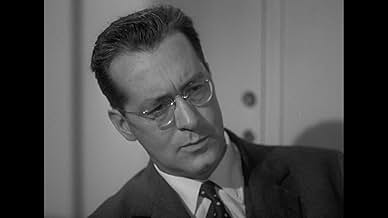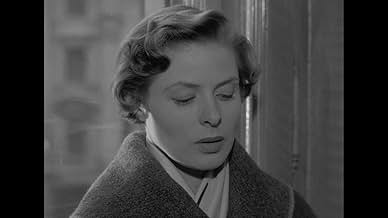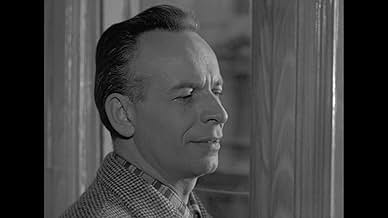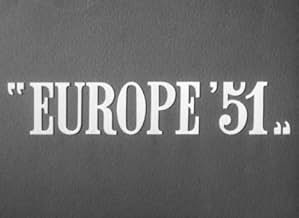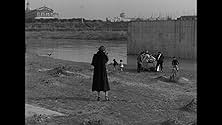IMDb-BEWERTUNG
7,4/10
5190
IHRE BEWERTUNG
Füge eine Handlung in deiner Sprache hinzuA wealthy woman becomes obsessed with humanitarianism when her young son dies after committing suicide.A wealthy woman becomes obsessed with humanitarianism when her young son dies after committing suicide.A wealthy woman becomes obsessed with humanitarianism when her young son dies after committing suicide.
- Auszeichnungen
- 4 Gewinne & 1 Nominierung insgesamt
Carlo Hintermann
- Extra
- (Nicht genannt)
Antonio Pietrangeli
- Psichiatra
- (Nicht genannt)
Rossana Rory
- Infermiera della casa di cura
- (Nicht genannt)
Empfohlene Bewertungen
Europa 51 has a big heart, this much is clear. It's a story where Rossellini and his collaborators want to pose a basic question: what does someone have to do, like literally do with their own hands and wills and TIME, actually taking time and energy out of their days, to make a difference for people? The question may be surrounded by an, arguably, heavy-handed set-up, where Ingrid Bergman plays an ambassador's wife in Italy, and their son, a bit of a spoiled mama's boy (or, no, maybe he's just the sensitive sort, you pick, but either way not dubbed particularly well), dies accidentally. Bergman's Irene can't stand herself for what has happened - all her time being a dilettante and not spending enough time with her son made this happen - and she can barely go on.
Someone, a friend who has Communist ties, tries to convince her that perhaps it's time to make a change amid this time of Societal Upheaval (in caps) as political sides are being more sharply drawn. She sees how people suffer, and a day at a factory basically makes her completely light-headed (a montage of images, if memory serves, makes this clear). She wants to help. Maybe if she puts her energies to positive use, to help others, she can... what, find some solace? Alleviate her guilt? Or that now she can't be a mother to her son - and there's not much effort between her and her husband to find love again - so why not be a Mother to others? It's a little more difficult than that, of course, which is the riding factor of conflict in the narrative.
Bergman plays this character with all of the beats just right. Early on in those first scenes with her and her son you might wonder whether the writing isn't totally clear - IS she being a bad mother, or is he just whining, or is it a little 'much' determining either, who knows - but she plays it just right, this woman in her life who has it all and doesn't have to worry about much. This includes hearing conversations about class struggles (this before she sees them first hand) and can barely comprehend it. How Bergman channels grief is even better, showing us a face that has the life totally drained out, and she is always *listening* as an actress too to what's around her, and is a strong listener which is key. Ironic then that many of these, almost all of them, are speaking Italian and are dubbed over - this includes Giuletta Masina, who plays a local housewife.
Not all of the writing is superb here, at least for me. It's surprisingly melodramatic in its last quarter as Irene is looked at as being completely crazy (possibly, borderline, criminal) in how she's helping these people, which includes keeping one man evading prosecution in her home. I have to wonder if this story could work today, though a filmmaker like Scorsese, one of Rossellini's disciples, sort of made his version with Bringing Out the Dead - a protagonist who is haunted by death and wants to make a difference. It is a very hard thing to be saintly, or just be a decent person when there are many, many indecent things and people that go about in this world, certainly in this context post-war, post-fascist-cum-Communist Italy.
There's a lot to digest here, even if some of it may come off as dated or simplistic. But, once again as with Stromboli, the combination of a director with a clear, very moral message, and an actress giving it her ALL (and it's a case where Bergman does give one of her best performances from this period, even if the film isn't), that you can watch it and be wrapped up in this woman's drama.
Someone, a friend who has Communist ties, tries to convince her that perhaps it's time to make a change amid this time of Societal Upheaval (in caps) as political sides are being more sharply drawn. She sees how people suffer, and a day at a factory basically makes her completely light-headed (a montage of images, if memory serves, makes this clear). She wants to help. Maybe if she puts her energies to positive use, to help others, she can... what, find some solace? Alleviate her guilt? Or that now she can't be a mother to her son - and there's not much effort between her and her husband to find love again - so why not be a Mother to others? It's a little more difficult than that, of course, which is the riding factor of conflict in the narrative.
Bergman plays this character with all of the beats just right. Early on in those first scenes with her and her son you might wonder whether the writing isn't totally clear - IS she being a bad mother, or is he just whining, or is it a little 'much' determining either, who knows - but she plays it just right, this woman in her life who has it all and doesn't have to worry about much. This includes hearing conversations about class struggles (this before she sees them first hand) and can barely comprehend it. How Bergman channels grief is even better, showing us a face that has the life totally drained out, and she is always *listening* as an actress too to what's around her, and is a strong listener which is key. Ironic then that many of these, almost all of them, are speaking Italian and are dubbed over - this includes Giuletta Masina, who plays a local housewife.
Not all of the writing is superb here, at least for me. It's surprisingly melodramatic in its last quarter as Irene is looked at as being completely crazy (possibly, borderline, criminal) in how she's helping these people, which includes keeping one man evading prosecution in her home. I have to wonder if this story could work today, though a filmmaker like Scorsese, one of Rossellini's disciples, sort of made his version with Bringing Out the Dead - a protagonist who is haunted by death and wants to make a difference. It is a very hard thing to be saintly, or just be a decent person when there are many, many indecent things and people that go about in this world, certainly in this context post-war, post-fascist-cum-Communist Italy.
There's a lot to digest here, even if some of it may come off as dated or simplistic. But, once again as with Stromboli, the combination of a director with a clear, very moral message, and an actress giving it her ALL (and it's a case where Bergman does give one of her best performances from this period, even if the film isn't), that you can watch it and be wrapped up in this woman's drama.
It's a bit melodramatic, but up until Irene's final conversation with Cassatti the Commie, *Europa '51* is a very interesting film, first about a pampered rich woman's reaction to her son's death, then about the difference between windy Marxist propaganda and real compassion.
However, at that point, Rossellini's original idea takes over: He wanted to make a film about what would happen if a truly saintly person ever showed up in the modern world. And he had a very good idea of what would happen--or at least a very insistent one. The people here obviously behave the way they do solely to make the point Rossellini wants to make, even when their behavior doesn't seem very plausible. In defter hands, such manipulation can work. Here, though, you can see the tracks Rossellini has rather clumsily laid down to move the story where he wants it to go.
However, at that point, Rossellini's original idea takes over: He wanted to make a film about what would happen if a truly saintly person ever showed up in the modern world. And he had a very good idea of what would happen--or at least a very insistent one. The people here obviously behave the way they do solely to make the point Rossellini wants to make, even when their behavior doesn't seem very plausible. In defter hands, such manipulation can work. Here, though, you can see the tracks Rossellini has rather clumsily laid down to move the story where he wants it to go.
"Europa 51" may be the best of all the Bergman/Rosselini collaborations of the fifties,outshining such works as "Viaggio in Italia" or "Stromboli,terra de dio". There are two worlds in this god almighty universe:the one in which time is only a quiet river,and the one in which time is killing you.Irène (Bergman)belongs to the former one.Masina's character and Inès,the prostitute to the wrong side of town. When her son committed suicide,Irène was chatting,exchanging trivialities with her posh guests.Eaten with remorse,she realizes her taste for society life took the best of her and now it's too late!
One of her friends opens the gates of a then-unknown world for her:factories where men sweat ,streets where whores roam,slums where mothers strive to feed thir starving children.The man is a Marxist,and he tells Irene about a brand new world where justice and solidarity will be the golden rule.
However,Irene cannot subscribe to this ideology:"This world is not mine because it does not include Michel"-her late son".Beyond that point,the movie turns Christian;Marxist materialism cannot satisfy a desperate woman whose spiritual longing is intense.So she takes altruism to new limits,forgetting all about herself,becoming some kind of Mother Theresa.Christian,too Christian...Her family begins to think she 's lost her mind,and they locked her up in an insane asylum.
Is the ending optimistic or pessimistic?I would opt for the first epithet:behind her bars,Irène can see her new friends come and worship her as a saint.She's lost her wealth,but Michel's death was the beginning of an end for her.Through this redemption,she knows that now,this unfortunate boy forgave her
This is one of Bergman's unfairly forgotten performances.It is accessible and should appeal to a very large public.
One of her friends opens the gates of a then-unknown world for her:factories where men sweat ,streets where whores roam,slums where mothers strive to feed thir starving children.The man is a Marxist,and he tells Irene about a brand new world where justice and solidarity will be the golden rule.
However,Irene cannot subscribe to this ideology:"This world is not mine because it does not include Michel"-her late son".Beyond that point,the movie turns Christian;Marxist materialism cannot satisfy a desperate woman whose spiritual longing is intense.So she takes altruism to new limits,forgetting all about herself,becoming some kind of Mother Theresa.Christian,too Christian...Her family begins to think she 's lost her mind,and they locked her up in an insane asylum.
Is the ending optimistic or pessimistic?I would opt for the first epithet:behind her bars,Irène can see her new friends come and worship her as a saint.She's lost her wealth,but Michel's death was the beginning of an end for her.Through this redemption,she knows that now,this unfortunate boy forgave her
This is one of Bergman's unfairly forgotten performances.It is accessible and should appeal to a very large public.
Ingrid Bergman highlights in this compelling melodrama about a burgeois mother who becomes aware of the unfortunate social classes after the loss of a son. The film goes a step further and can also be read as the social portrait of the European status quo after the Great War. Some dialogs may appear evident and simplistic as far as ideology is concerned, but the impressive conclusion and the characteristic Rossellini's style makes it one of the most interesting films of his director and a valuable document about psychological war consequences which hasn't loose relevance.
"Europa '51" is one of the most unique films I have seen and for that reason alone, it's well worth seeing.
The story begins oddly. A couple have a son they describe as 'unusually sensitive'. In reality, he clearly is mentally ill as he ends up killing himself even though he is a young boy. While very rare, such things do occur and not surprisingly it radically impacts on his parents. The father becomes more stoic and distant and the mother (Ingrid Bergman) begins to notice the plight of the poor and begins spending more and more time with them helping them with their problems. After a while, the wife is home less and less (possibly in response to her aloof husband) and he assumes she must be insane and acts accordingly.
The mother's reaction to grief and guilt about her son's death is the driving force in this film. But it's also interesting how doctors, priests and the police react to the lady's philanthropy. Overall, a tough film to describe but well acted and never dull.
By the way, the mother of six in the film (Giulietta Masina) was the real life wife of the famed Italian director, Fellini. Here she is quite good in this supporting role.
The story begins oddly. A couple have a son they describe as 'unusually sensitive'. In reality, he clearly is mentally ill as he ends up killing himself even though he is a young boy. While very rare, such things do occur and not surprisingly it radically impacts on his parents. The father becomes more stoic and distant and the mother (Ingrid Bergman) begins to notice the plight of the poor and begins spending more and more time with them helping them with their problems. After a while, the wife is home less and less (possibly in response to her aloof husband) and he assumes she must be insane and acts accordingly.
The mother's reaction to grief and guilt about her son's death is the driving force in this film. But it's also interesting how doctors, priests and the police react to the lady's philanthropy. Overall, a tough film to describe but well acted and never dull.
By the way, the mother of six in the film (Giulietta Masina) was the real life wife of the famed Italian director, Fellini. Here she is quite good in this supporting role.
Wusstest du schon
- WissenswertesThe square Irene and Andrea drive to is the Campidoglio in Rome. The equestrian statue is of Marcus Aurelius, emperor and stoic philosopher.
- PatzerWhen Michele falls down the stairs, his parents rush to the car to get him to the hospital. When his mother finds him, she is wearing the white gown she wore at the dinner. When they first arrive at the hospital, she has a fur coat on. A few hours later, suddenly she has changed into a grey suit.
- Zitate
Irene Girard: It is just that the love we feel for those closest to us, for those who should be and maybe really are dearest to us, suddenly isn't enough. It seems too selfish, too narrow. So, that we feel the need to share it, to make our love bigger until it embraces everyone.
- Alternative VersionenIngrid Bergman, Alexander Knox and the other English-speaking actors dub their own voices into English for the English version.
- VerbindungenEdited into Damned! Daney (1991)
- SoundtracksBésame Mucho
Written by Consuelo Velázquez
Top-Auswahl
Melde dich zum Bewerten an und greife auf die Watchlist für personalisierte Empfehlungen zu.
- How long is Europe '51?Powered by Alexa
Details
Box Office
- Weltweiter Bruttoertrag
- 9.381 $
- Laufzeit
- 1 Std. 58 Min.(118 min)
- Farbe
- Seitenverhältnis
- 1.37 : 1
Zu dieser Seite beitragen
Bearbeitung vorschlagen oder fehlenden Inhalt hinzufügen

